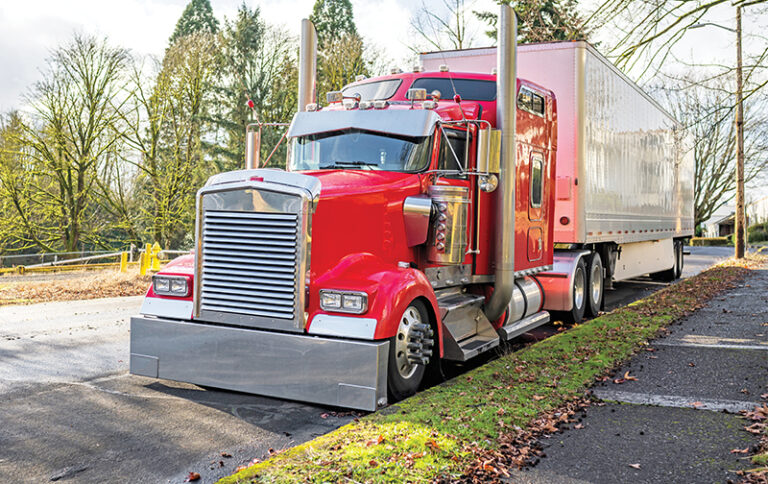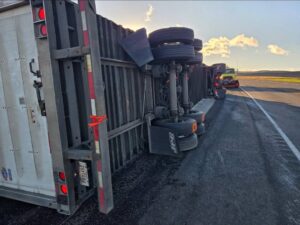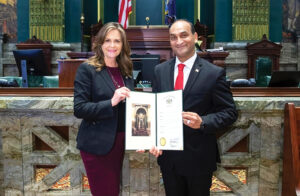The Federal Highway Administration (FHWA) reports that a shortage of truck parking sites is a critical safety concern for the nation. But what if a lack of commercial truck parking isn’t a big concern at the state and city levels?
In several areas, this is a reality.
The Minnesota Trucking Association (MTA) recently sent a letter to the Minneapolis City Council — a council that, for the second time is reviewing a citywide truck parking ban. Under the proposal, trucks weighing 26,000 pounds or more would not be allowed to street park.
“(The proposed ban) is in response to complaints by residents and business owners who say that trucks are creating problems for their businesses and some safety hazards, and they brought those concerns to their city council members,” said John Hausladen, president of MTA.
“The troublesome part for us is that it is a broad-brush approach to a problem that is very complex. We have two major concerns,” he continued. “It will directly impact commerce and the ability to keep logistics chains flowing. Fully laden trucks that are parked in the city are there for a reason — and it is to serve the citizens and businesses of Minneapolis. … The other issue, which is equally as important, is there are many independent contractors who are residents of the city of Minneapolis.”
If approved, the ban would force truck drivers to park outside the city, which would impede on-time deliveries and disrupt daily commerce, according to MTA. Truck parking is already banned in residential areas in Minneapolis. Hausladen said many of the trucks regularly parked overnight within the city limits belong to owner-operators who live in the city.
According to the MTA, 96.5% of manufactured tonnage is transported by truck in Minnesota. There are 21,560 trucking companies in Minnesota; those companies employ 13,150 heavy and tractor-trailer drivers.
“Our case to the city is that this broad-brush approach is not the best, and that they should look for more targeted approaches and look at finding ways to help develop safe parking for truck drivers, because as we know, there is a significant nationwide shortage of commercial truck parking,” Hausladen said. “These people carried us through the pandemic. They were there when we needed them. Now we’re telling them, ‘But we don’t want you. Go park your truck somewhere else.’”
After being submitted to the city council’s transportation public works committee for a second time, the language of the ordinance was changed. It now proposes partnerships for developing truck parking sites.
“The language adopted puts the city in a purely reactive role, providing interested parties with only site search assistance,” Hausladen said. “Language asking for greater regional solutions is all good, but it doesn’t change the fact that starting Jan. 1, 2022, trucks will be ticketed for parking on Minneapolis city streets — with no new safe parking options.”
That is, if the ordinance passed. The Minneapolis City Council is scheduled to vote on the ordinance on Friday, July 23.
In 2019, the Minneapolis City Council heard a proposal of a similar nature; however, the proposal did not make it to a vote.
“The full city council was set to vote on it and ultimately sent it back to the committee,” Hausladen said. “There were, fortunately, enough voices raised that the full city council agreed that they needed to take a step back.”
In Michigan, another MTA — the Michigan Trucking Association — is facing a similar challenge: The Detroit City Council is looking at an ordinance to reroute areas in which big rigs are allowed to operate.
Mickey Blashfield, president of the Michigan Trucking Association, says this shouldn’t be a problem — as long as the city does not stray from adding more to the ordinance than just designating truck routes.
“They’re looking at trying to keep trucks out of residential neighborhoods,” Blashfield said. “More than anything, I think it updates things after the last decade in Detroit, which has seen a ton of construction.”
Blashfield, along with the rest of the association, is working with the city council to find a balance that can reroute trucking without causing harm to the industry.
While Minneapolis and Detroit may soon offer additional challenges for drivers seeking safe parking, such challenges at the local level are nothing new.
In Las Vegas, standard protocol made it illegal for big rigs to park in residential neighborhoods, but there was no enforcement. That changed in 2019.
Fines are now enforced for any truck owner who parks in a residential neighborhood. Owners are fined $100 for a first offense, $250 for the second offense and $500 for every subsequent offense.
“We know we have a truck parking issue all across the country, but Las Vegas is probably a little more acute, because land costs so much there, and there’s really not a lot of land,” said Paul Enos, president of the Nevada Trucking Association (NTA). “In a state like Nevada, less than 5% of the land is in the hands of the private sector and mostly government (owned). That makes land more expensive because we are not an attainment zone, so it’s not like you can just put a lot out and have trucks parked; you have to pay for that.”
If there are little to no truck parking facilities available, drivers are apt to find parking in a nearby residential neighborhood.
To mitigate the issue, NTA has worked to dedicate funding for safe truck parking. Through a 10% increase of the diesel tax and a truck parking and interstate freight plan, truck parking has been made more accessible for drivers. In 2020, the city of Las Vegas allocated $7.1 million for truck parking.
“I do think that truck parking is a national problem,” Enos said. “But when you look at where these issues tend to arise and who has the purview to deal with land usage issues, it’s local governments.”
According to Enos, local governments are “great” about focusing on job creation and building businesses, convention centers and warehouses to make that all possible. However, “They’re not so great at thinking about freight,” he said.
“To me, I think the balance to address the truck parking issue is going to be best addressed at the local level, and it’s going to have to be something that all of these folks are building,” Enos said. “Whether you’re building warehouses in strip malls, they’re going to have to contribute to (truck parking).”
Enos isn’t the only one in the trucking industry who is seeing a shortage rise with truck parking at the local level.
“I think that we’re in an environment where the trucking industry, when it sees challenges, it has to step up and it has to speak,” said Minnesota’s Hausladen.
“Of course, organizations like the MTA do that, but individual voices, truck drivers, trucking fleets have to make their voices heard in all of these forums. I think there’s just going to be more challenges at the local level and so it’s going to be more important to engage local governments on these really critical issues,” he continued. “I do think that individual truck drivers who spoke up in this process have been helpful in slowing this down and putting a face on these decisions that affect livelihoods and people.”
Hannah Butler is a lover of interesting people, places, photos and the written word. Butler is a former community newspaper reporter and editor for Arkansas Tech University’s student newspaper. Butler is currently finishing up her undergraduate print journalism degree and hopes to pursue higher education. Her work has been featured in at least nine different publications.
















It’s good to see a city with their priorities in good order.
I bet if the trucks just don’t deliver to those cities U won’t be saying that.
I hope those STARVE .I CERTAIN will not bring freight to that area
Whatever happened to Jason’s Law? I won’t be delivering to MN anytime soon. Boston is just as bad with their no idle law. Don’t worry if the temps are minus 20 below, just freeze your ass off and hope you make until you’re ready to roll. Maybe we need a boycott of all the states that regard trucks as a nuisance.
I bet if the trucks just don’t deliver to those cities U won’t be saying that.
Nuthing new…HWEVR let’s look at say NYC…ORLANDO – MICHIGAN..BOSTON…NORTHEAST CORRIDORS…MASS PRKING FAR FEW AHN IN BETWEEN ALL DAY & NGHT EVEN WALLMARTS WHO HAVE ROOM FOR MNNY OVRNGHTS IN TOWNS THAT BANN COMERICAL.prking with or with out local deliveries nxt day….ordinance must override MT or access to reasonable zoned commercial space to park at or near stores for safety purposes when without fright hauling ther shelf would be MT